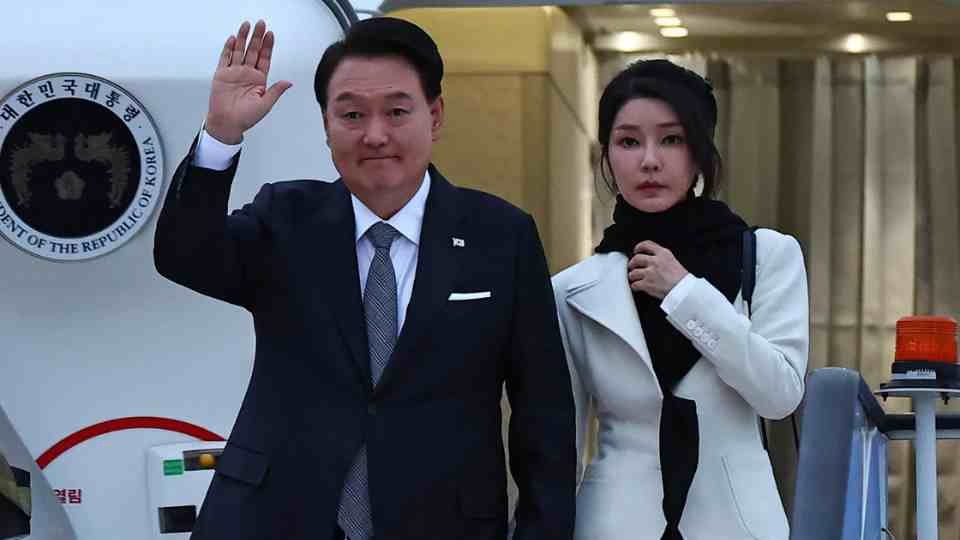In a watershed moment for South Korean politics, the nation witnessed an unprecedented legal development as Kim Keon Hee, wife of impeached former President Yoon Suk Yeol, was arrested after a court issued a warrant following accusations of graft that she denies. This historic arrest marks the first time a presidential spouse has been jailed on criminal charges in the country’s modern history.
The Dramatic Turn of Events
The 52-year-old former first lady was taken into custody late Tuesday evening when Seoul Central District Court approved prosecutors’ detention warrant. The arrest came as part of an ongoing investigation into allegations ranging from suspected stock manipulation to bribery, casting another dark shadow over South Korea’s highest office.
This extraordinary situation means that for the first time in South Korean history, both a former president and former first lady are simultaneously behind bars, creating an unprecedented constitutional and political crisis that has captivated the nation.

A Web of Serious Allegations
Kim Keon Hee faces a complex array of charges that span multiple areas of criminal law:
Stock Manipulation Charges: Prosecutors allege that Kim engaged in fraudulent stock trading schemes involving a local BMW dealership, potentially earning hundreds of thousands of dollars through illegal price manipulation. These activities reportedly occurred before her husband assumed the presidency but continued to cast a shadow over his administration.
Bribery and Corruption: The charges against her include stock fraud, bribery and illegal influence peddling. Investigators claim she accepted luxury gifts, including high-end designer bags, in exchange for political favors and business advantages. These alleged transactions represent a clear violation of anti-corruption laws designed to prevent such quid pro quo arrangements.

Election Interference: Perhaps most damaging to the democratic process, investigators say the former president and first lady exerted undue influence on the conservative People Power Party to nominate a specific candidate during a 2022 election. This allegation strikes at the heart of South Korea’s electoral integrity and raises serious questions about the abuse of presidential power.
Illegal Political Influence: Beyond direct election interference, Kim is accused of leveraging her position as first lady to inappropriately influence government decisions, interfering with candidate nominations during both parliamentary by-elections and general elections.
The Broader Political Context
This arrest occurs against the backdrop of South Korea’s ongoing political turmoil. Kim’s husband, former President Yoon Suk Yeol, was impeached and arrested earlier this year following his controversial and short-lived declaration of martial law in December 2024. The martial law declaration, which lasted only hours before being overturned by the National Assembly, triggered a constitutional crisis that ultimately led to Yoon’s removal from office.
South Korea has a well-documented pattern of former presidents facing legal troubles after leaving office, but the simultaneous imprisonment of both a former president and first lady represents uncharted territory for the nation’s democracy. The situation has created a complex legal and political landscape that continues to evolve.
Personal Background and Marriage
Kim married Yoon in 2012 and the couple has no children. Born Kim Myeong-sin in 1972 in Yangpyeong, Gyeonggi Province, she legally changed her name to Kim Keon Hee in 2008. Her background before entering the political spotlight included various business ventures, some of which are now under scrutiny as part of the current legal proceedings.
Implications for South Korean Democracy
This historic moment raises profound questions about accountability, power, and justice in South Korean politics. The fact that both the former president and first lady are now facing serious criminal charges simultaneously represents either a triumph of the rule of law or a symptom of deeper systemic issues within the country’s political establishment.
The arrests demonstrate that South Korea’s judicial system is willing to pursue cases against the highest levels of government, regardless of political consequences. However, they also highlight ongoing concerns about corruption and abuse of power that have plagued the nation’s political landscape for decades.
Looking Forward
As both cases proceed through the legal system, South Korea faces the challenge of maintaining political stability while ensuring that justice is served. The outcomes of these trials will likely have lasting implications for how future presidents and first ladies conduct themselves in office and how the nation addresses corruption at the highest levels of government.
The unprecedented nature of these events ensures that South Korea’s legal and political institutions are being tested in ways they have never experienced before. How the country navigates this crisis may well define the strength and resilience of its democratic system for years to come.
This historic moment serves as a stark reminder that in a functioning democracy, no one—regardless of their position or status—is above the law. As both Kim Keon Hee and Yoon Suk Yeol await their respective trials, South Korea continues to grapple with the fallout from this extraordinary chapter in its political history.






